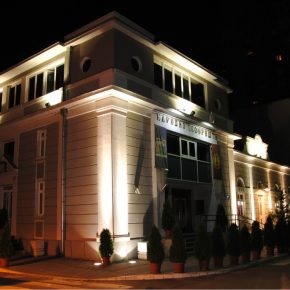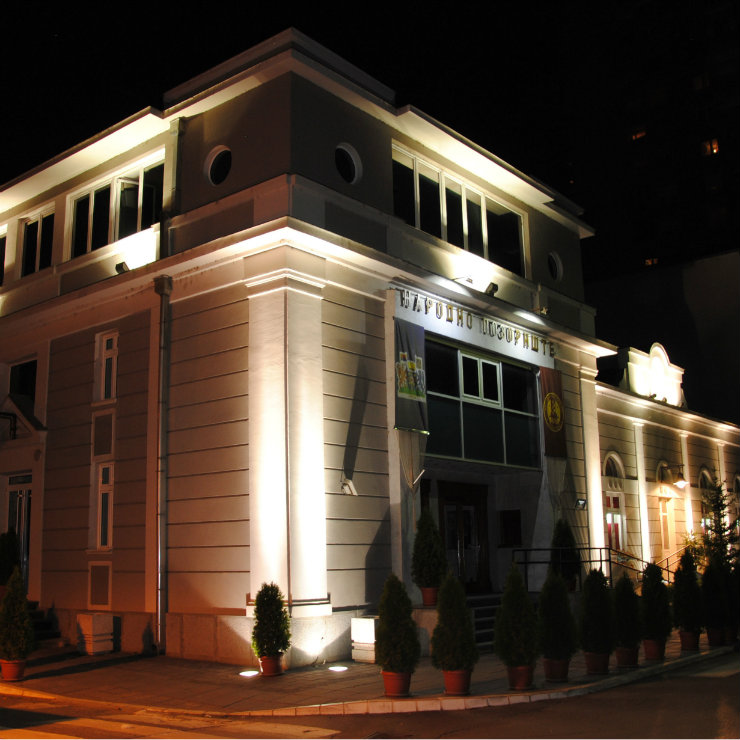Tydzień w gospodarce
Category: Trendy gospodarcze
Analyst, journalist specializing in the Western Balkans and Middle East domestic and foreign affairs

Leskovac, Serbia (Narodno pozriste Leskovac, CC BY-SA)
Other Central and Southeast European (CSE) countries hold lion’s share of the top 10. The other three countries on the list of the best countries destined for estimated jobs created per million inhabitants — Bosnia and Herzegovina, Slovenia and Macedonia — are also the countries of the former Yugoslavia, which (apart from Slovenia) lag behind their peers from the Central Europe (CE), indicating that efforts of the governments in the region to attract the investors.
Low costs in countries such as Bosnia and Herzegovina, Macedonia and Serbia have also proved to be attractive for investors, as job market pressures increase costs in the CE. Serbia „continues to gain significant investment in key sectors, such as textiles, transport equipment, chemicals and electronics. It is not surprising that production activities account for almost 80 per cent of all jobs created by the FDI,” the report states. „The continued strong performance of Serbia and the wider Western Balkans is witnessing the region’s growing success in attracting foreign investment and cementing its position in global value chains. While individual countries’ performance varies from year to year, the region as a whole is experiencing a sustainable high level of interest by foreign investors”, states the IBM study.
The Serbian government is well aware of this. Serbia’s Minister of Finance Siniša Mali announced that in 2019 a capital investment commission will be set up to deal with the largest projects, and will, according to a special methodology, determine which of them are the priority. In October, Mali met with the regional director of the World Bank (WB) for Western Balkans, Europe and Central Asia, Linda Van Gelder, and talked about ongoing projects in cooperation with the World Bank, as well as plans for future cooperation. He stressed the importance of cooperation with the World Bank and mentioned 12 active WB projects, worth USD1.8bn. The finance ministry, as he said, has four priorities — tax administration reform, development and growth of the economy, further privatization and restraint of public enterprises and capital investment.
Linda Van Gelder, World Bank’s Director for the Western Balkans, praised Serbian financial results and stressed that the development of the Economic Development Plan for Serbia will include guidelines for future development. As she explained, this implies a deep analysis, which will give special emphasis to fields, or areas with the greatest potential, in which the Serbian economy can develop.
Also IMF visited Belgrade. Structural reforms are a priority for Serbia in the coming year, as was assessed at the meeting of the Prime Minister Ana Brnabić with the head of the International Monetary Fund’s mission, James Roof. They discussed the results of implementing a new program of macroeconomic and structural reforms supported by the Policy Coordination Instrument.
Mr. Roof pointed out a significant increase in nominal GDP and lowering public debt, and added that it is a great surprise that the economic growth rate for the whole year has been revised from 3.5 per cent to 4.2 per cent. He also was glad with the Ministry of Finance that Tax Administration reform, set as a priority in 2019. Ms. Brnabić pointed out that in 2018 Serbia achieved very good macroeconomic results, and that it is important to maintain the GDP growth. She estimates that, in order to achieve the expected growth, public and infrastructure investments are needed, as well as measures to stimulate innovation.
According to IMF, Serbia has attracted more than half of the total foreign direct investment (FDI) realized in the six Western Balkan economies (WB6) for the last ten years. “Strengthening institutions, skilled workforce and good infrastructure are of key importance for attracting FDIs in the Western Balkans and new EU member states,” the IMF believes.
According to the IMF budget revenues, rather than subsidies, should focus on investing in education, training and infrastructure. In the Western Balkans countries, the biggest benefit is the strengthening of the institutions.
Since 2010 until today the major investors coming to Serbia have been the Netherlands, Cyprus and Luxembourg, although none of those represent the larger companies investing in Serbian economy. So far, the largest net investment in Serbia was from the Netherlands (EUR2.39bn), followed by Austria (EUR1.96bn), Luxembourg (EUR1.9bn), Russia (EUR1, 54bn), and Germany (EUR1.1bn). Cyprus is the tenth with about EUR451.3m worth investment. The Serbian Development Agency points out that the total FDI has amounted EUR16.25bn since 2010, and the single most successful year was 2011, when as much as EUR3.54bn was invested in Serbia.
On the other hand, when looking at the individual companies, the data on emerging countries do not coincide. Thus, according to Agency’s records, the largest investors from 2000 to September 2018 were „Telenor” from Norway, then „Intesa Sanpaolo” from Italy, „Delhaize” from Belgium, „Telekom” from Austria, and „Fiat Chrysler Cars” from Italy, followed by Philip Morris (USA), Stada (Germany) and the Russian Gazprom.
Additionally, through the EU development program, southern Serbian towns, Pirot (logistic centre), Dimitrovgrad (infrastructure development of the industrial zone), Leskovac (tourism and culture), Merošina (industrial zone), Vlasotinac (overall economic development), Surdulica (hotel developments) and Blace (water management), will receive nearly EUR100,000 for projects Brussels have approved to improve their local environment to attract investors. Still, for greater economic growth, Serbia needs even more of FDI, so it is necessary to change more things. The incentives played an important role in attracting FDI. A further investment in digitization and e-governance is also needed. As well as the infrastructure investment needs to be increased and there is a need to foster public-private partnerships, especially when it comes to local governments. Serbia has to address the issue of the regressive tax system because it now has the highest personal income tax.
The most important component is the rule of law. The further key element is the fight against corruption, which has to be urgently addressed in the whole region. Also, frequent legislative changes are not appropriate and although countries need to comply with EU rules and regulations, they should do so when they are ready. The changes to the law should be followed by analysis of the consequences for the economy.
Vedran Obućina is an analyst and a journalist specializing in the Croatian and Middle East domestic and foreign affairs. He is the Secretary of the Society for Mediterranean Studies at the University of Rijeka and a Foreign Affairs Analyst at The Atlantic Post.

